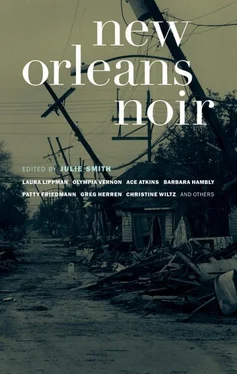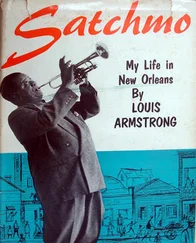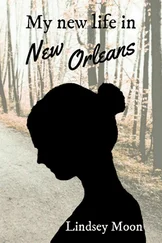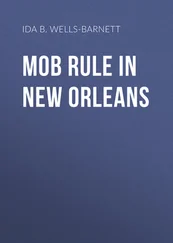“What about what?”
“Nothin’, I just...”
The husband is yelling now. “Listen, call the Berteaus. All you have to do is call ’em, goddammit! Just call ’em and let ’em tell you.”
“Like there was the least chance of that,” Cherice says ten months later. The encounter had led to the misery and indignity of incarceration for three days and two nights, plus the humiliation of being accused of looting — almost the hardest part to bear. But she has survived, she and Charles, to tell the story at a Fourth of July barbecue.
“Know why I was wastin’ my breath?” Charles chimes in. “’Cause that peckerwood was enjoyin’ himself. Wasn’t about to ruin his own good time.”
She and Charles are living in Harvey now, in a rental, not a FEMA trailer, thank God, until they decide what to do about their gutted house. Their families have all heard the story many times over, but they’ve made new friends here on the West Bank, people they haven’t yet swapped Katrina yarns with. Right now they have the rapt attention of Wyvette Johnson and her boyfriend Brandin. Cherice didn’t catch his last name.
Wyvette gets tears in her eyes. “Mmmm. Mmmm. What about those poor dogs?”
This annoys Cherice, because it’s getting ahead of the way she usually tells it. But she says, “I nearly blurted out that they were there at the last minute... before he took us away. But I thought they’d have a better chance if he didn’t know about ’em. Last thing I wanted was to get my dogs stole by some redneck cop.” Here she lets a sly smile play across her face. “Anyhow, I knew once Mathilde knew they was still in the house, that was gon’ give her a extra reason to come get us out.”
“Not that she needed it,” Charles adds. “She was happy as a pig in shit to hear we’d been dragged off to jail. I mean, not jail, more like a chain-link cage, and then the actual Big House. I ended up at Angola, you believe that? The jail flooded, remember that? And then they turned the train station into a jail. Oh man, that was some Third World shit! Couldn’t get a phone call for nothin’, and like I say, they put you in a cage. But one thing — it was the only damn thing in the city that whole week that worked halfway right. Kept you there a couple days, shipped you right out to Angola. But they got the women out of there just about right away. So Cherice was up at St. Gabriel — you know, where the women’s prison is — in just about twenty-four hours flat. And after that, it wasn’t no problem. ’Cause they actually had working phones there.”
Wyvette is shaking her silky dreads. “I think I’m missin’ somethin’ here — did you say Mathilde was happy y’all were in jail?”
“Well, not exactly,” Cherice says. “She was outraged — ’specially since I’d been there for two days when they finally let me make the call. It’s just that outrage is her favorite state of mind. See, who Mathilde is — I gotta give you her number; every black person in Louisiana oughta have it on speed dial — who Mathilde is, she’s the toughest civil rights lawyer in the state. That’s why Charles made sure to say her name. But that white boy just said, ‘Right,’ like he didn’t believe us. Course, we knew for sure she was gon’ hunt him down and fry his ass. Or die tryin’. But that didn’t make it no better at the time. In the end, Mathilde made us famous though. Knew she would.”
“Yeah, but we wouldn’t’ve got on CNN if it hadn’t been for you,” Charles says, smiling at her. “Or in the New York Times neither.”
Wyvette and Brandin are about bug-eyed.
“See what happened,” Charles continues, “Cherice went on eBay and found Mathilde’s mama’s engagement ring, the main thing she wanted us to bring to Highlands. Those cops were so arrogant they just put it right up there. In front of God and everybody.”
“But how did you know to do that?” Wyvette asks, and Cherice thinks it’s a good question.
“I didn’t,” she says. “I just felt so bad for Mathilde I was tryin’ anything and everywhere. Anyhow, once we found the jewelry, the cops set up a sting, busted the whole crime ring — there was three of ’em. Found a whole garage full of stuff they hadn’t sold yet.”
Brandin shakes his head and waves his beer. “Lawless times. Lawless times we live in.”
And Cherice laughs. “Well, guess what? We got to do a little lootin’ of our own. You ever hear of Priscilla Smith-Fredericks? She’s some big Hollywood producer. Came out and asked if she could buy our story for fifteen thousand dollars, you believe that? Gonna do a TV movie about what happened to us. I should feel bad about it, but those people got way more money than sense.”
Right after the holiday, Marty Carrera of Mojo Mart Productions finds himself in a meeting with a young producer who has what sounds to him like a good idea. Priscilla Smith-Fredericks lays a hand on his wrist, which he doesn’t much care for, but he tries not to cringe.
“Marty,” she says. “I believe in this story. This is an important story to tell — a story about corruption, about courage, about one woman’s struggle for justice in an unjust world. But most of all, it’s the story of two women, two women who’ve been together for twenty-two years — one the maid, the other the boss — about the love they have for each other, the way their lives are inextricably meshed. In a good way.
“I want to do this picture for them and... well... for the whole state of Louisiana. You know what? That poor state’s been screwed enough different ways it could write a sequel to the Kama Sutra . It’s been screwed by FEMA, it’s been screwed by the Corps of Engineers, it’s been screwed by the administration, it’s been screwed by its own crooked officials... Everybody’s picking carrion off its bones. And those poor Wardells! I want to do this for the Wardells. Those people have a house to rebuild. They need the money and they need the... well, the lift. The vindication.”
Marty Carrera looks at the paperwork she’s given him. She proposes to pay the Wardells a $15,000 flat fee, which seems low to him. Standard would be about $75,000, plus a percentage of the gross and maybe a $10,000 “technical consultant” fee. He shuffles pages, wondering if she’s done what he suspects.
And yes, of course she has. She’s inflated her own fee at the expense of the Wardells. She thinks she should get $100,000 as an associate producer, about twice what the job is worth. And not only that, she wants to award the technical consultant’s fee to herself.
Marty is genuinely angry about this. She’s roused his sympathy for the wrongfully accused couple, and even for the beleaguered state, and he too believes the Wardells’ story — or more properly, Mathilde and Cherice’s story — would make a great movie for television.
However, he thinks Ms. Smith-Fredericks is a species of vermin. “After looking at the figures,” he says, “I think I can honestly say that you seem uniquely qualified to do a piece on looting.”
But she doesn’t catch his meaning. She’s so full of herself all she hears is what she wants to hear. She sticks out her hand to shake
Well, so be it, Marty thinks. I tried to warn her.
His production company doesn’t need her. So what if she found the story and brought it to him? He’s not obligated to... Well, he is, but...
“Marty,” she says, “we’re going to be great together.”
He shakes her hand absentmindedly, already thinking of ways to cut her out of the deal.
Angola South
by Ace Atkins
Loyola Avenue
The child was small and black, shirtless, wearing only a filthy pair of Spider-Man pajama bottoms and carrying a skinned-up football. His fingers still felt numb from holding his mother’s hand all night and he now found himself standing on top of the interstate overpass looking down at a maze of swamped streets.
Читать дальше












